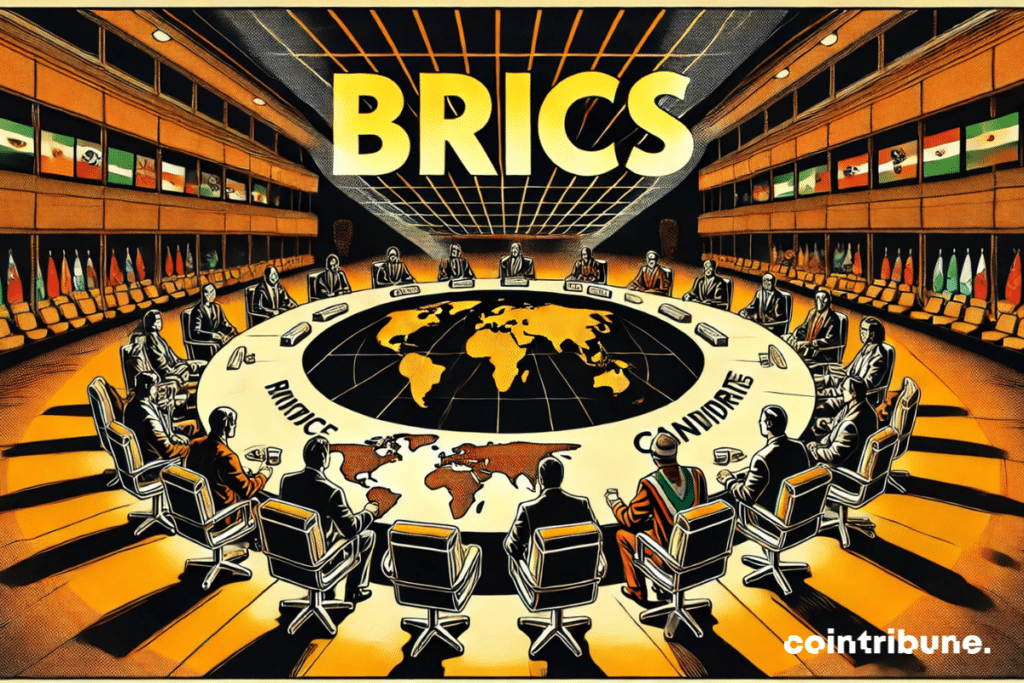Why Are 23 Countries Eager To Join BRICS ?
The global economic landscape, long dominated by Western powers and supported by the preeminence of the dollar, seems to be on the brink of a change. In the face of a financial system centralized around the United States and Europe, many nations are expressing an increasing willingness to turn towards alternatives. This trend is accelerating with the recent announcement: more than twenty countries, from multiple continents, have officially submitted their candidacies to join the BRICS in 2025. If this project comes to fruition, the expansion of the formed bloc could strengthen its economic weight, but also redefine the balance of power on a global scale.

The BRICS Facing an Unprecedented Wave of Candidacies
For many years now, the BRICS have sparked growing interest from emerging economies, eager to emancipate themselves from traditional financial structures dominated by the West. In 2025, the alliance could undergo a major transformation, with the official candidacies of twenty-three countries, including Azerbaijan, Bahrain, Bangladesh, Burkina Faso, Cambodia, Chad, Colombia, the Republic of the Congo, Equatorial Guinea, Honduras, Laos, Kuwait, Morocco, Myanmar, Nicaragua, Pakistan, Palestine, Senegal, South Sudan, Sri Lanka, Syria, Venezuela, and Zimbabwe.
This mobilization reflects a common will among these nations to reduce their dependence on the US dollar, perceived as an instrument of economic domination. For them, integrating into the BRICS represents an opportunity to reinforce their financial sovereignty in order to access new commercial dynamics. Through the adoption of systems that favor transactions in local currencies, these countries hope to minimize the risks associated with fluctuations of the greenback. Moreover, they can consolidate their exchanges with powers such as China and India. This potential enlargement of the BRICS thus illustrates an active search for more inclusive and diversified economic balances.
Towards a Global Geopolitical Rebalancing ?
The enlargement of the BRICS is likely to profoundly disrupt global economic and political balances. To date, the bloc represents nearly 40% of the world population and a substantial share of global GDP, but the integration of new members could increase its weight and influence. This scenario alarms several Western powers, which perceive this expansion as a lever that allows major players such as China and Russia to consolidate their dominance over international markets.
At the same time, the project of creating a common currency, discussed for several years within the BRICS, could be revived and realized thanks to this enlargement. Such an initiative would aim to reduce the members’ dependence on the US dollar and facilitate intra-bloc transactions. Some observers believe that a common currency could also transform global exchanges through a gradual dedollarization, particularly in the oil trade and other strategic sectors.
However, the ambitions of the BRICS are not without challenges. The heterogeneity of the candidate economies, with varied profiles and priorities, risks complicating the implementation of common strategies. Moreover, geopolitical disputes between certain current and potential members could hinder the cohesion of the bloc, limiting its ability to act in a unified manner. Despite these obstacles, this expansion offers a glimpse into a developing multipolar world, where economic power would be distributed more equitably among nations.
With 23 countries in the running to join the alliance, the BRICS are reinforcing their position as a major player in global economic transformations. If these candidacies succeed in 2025, the enlargement will mark a decisive step towards a multipolar world, where economic decisions will no longer be exclusively concentrated in the hands of Western powers. However, the real challenge for the BRICS lies in their ability to harmonize the diverse interests of their members and to effectively structure this expansion. Succeeding in this endeavor could redefine global financial dynamics, but also offer emerging nations a stronger voice on the international stage.
Maximize your Cointribune experience with our "Read to Earn" program! For every article you read, earn points and access exclusive rewards. Sign up now and start earning benefits.
Diplômé de Sciences Po Toulouse et titulaire d'une certification consultant blockchain délivrée par Alyra, j'ai rejoint l'aventure Cointribune en 2019. Convaincu du potentiel de la blockchain pour transformer de nombreux secteurs de l'économie, j'ai pris l'engagement de sensibiliser et d'informer le grand public sur cet écosystème en constante évolution. Mon objectif est de permettre à chacun de mieux comprendre la blockchain et de saisir les opportunités qu'elle offre. Je m'efforce chaque jour de fournir une analyse objective de l'actualité, de décrypter les tendances du marché, de relayer les dernières innovations technologiques et de mettre en perspective les enjeux économiques et sociétaux de cette révolution en marche.
The views, thoughts, and opinions expressed in this article belong solely to the author, and should not be taken as investment advice. Do your own research before taking any investment decisions.